- Home
- Jeff Mariotte
Right to Die Page 3
Right to Die Read online
Page 3
“Which means,” Horatio said, “that at least one of our shooters is the careful sort, and picked up after him or herself.”
“We also didn’t see any blood spatter other than the victim’s, Horatio.”
“So the victim’s shot or shots probably missed their targets.”
“That’s how I read it.”
“In that case, we’ll have to take another look around that park. There may be bullets there that we didn’t know we were looking for.”
“I’ve still got some work to do here,” Calleigh said. “I want to get these scanned and into the FBI ballistics database.”
To see if the striation marks matched those on any bullets known to have been used in other crimes, Horatio knew. “I’ll send Eric and Ryan,” he said. “Thank you, Calleigh.”
Eric Delko loved to be outdoors. He didn’t mind working in the lab, with its artificial light and canned air, but he preferred the real thing—sunlight, fresh air, green grass, the calls of birds, and the smells of life—when possible.
Besides, some of the beautiful babes for whom Miami was justifiably famous might be in the park, and Eric liked being in the presence of babes.
So being sent back to Bicentennial Park was no hardship for him.
He had driven the crime lab’s Hummer, with Ryan Wolfe riding shotgun. Wolfe was, as he put it, “a little OCD,” and Eric suspected his fellow CSI was actually happier in the controlled conditions of the lab. But he went where he was needed, and he didn’t complain, even if he wasn’t as enthusiastic about this particular assignment as Eric was.
“It’s weird that someone went to all the trouble to pick up shell casings—even from a gun they didn’t fire,” Ryan said. “And still left all of that cocaine behind.”
“I guess our killer doesn’t use or deal,” Eric said.
“Not everybody does.”
“I tend to think of murderers as being among the less discriminating citizens out there. But you’re right—not every killer is a user.”
They stood at the edge of the tall grass. Eric was glad the gardener hadn’t come back to cut it yet. The removal crew had trampled some of it down when they took the victim’s body out, but the area where he had fallen, beside the wall, was still fairly distinct. Eric had photos and diagrams in his hand showing precisely where the body had been and in what position. Blood spatter on the wall and the mark the bullet had made chipping the concrete would confirm where they needed to be.
The first time out, they had brought a male bendy dummy with them, a life-size figure they could manipulate into any position a man could get into, and trajectory rods with built-in laser pointers. By working backward from the John Doe’s position on the ground, they were able to approximate how and where he must have been standing when he was shot. Inserting the trajectory rods where the victim’s wounds were, they used the lasers to show them where the two shooters would have been. One of the shooters had been standing upright, they had determined, the other crouching or exceptionally short.
In both spots they had found pressed-down grasses, and in one, beneath a flowering tree, a couple of fibers had been removed from the knife-edge of a blade of saw grass. Those fibers were back at the lab waiting to be identified. Their task now was to find whatever bullets their victim might have fired, which meant following the imaginary lines from the victim toward and past the shooters’ locations. Of course, his shots might have been wild, especially if he had fired after being hit, which meant the stray bullets could be just about anywhere.
“Which way do you want to start?” Eric asked.
Ryan shrugged. In his melon-colored shirt with the tail hanging out, a periwinkle suit, and spiked hair, he could have been one of the models so common in Miami, instead of a cop. “I can go toward the road,” he said. “You go toward the water?”
“Okay, but I’m not going in unless I have to. I’ve got a wet suit in the vehicle, just in case.” Eric was the team’s diver, and as much as he liked being outside, he cherished time spent underwater, in that special environment like nothing else on Earth. Getting in and out of the gear was a hassle, though, that he hoped to avoid for now. Finding a single bullet out there could be an all-day task.
“Works for me,” Ryan said. “Let’s get started.” He didn’t wait for Eric’s answer but headed out to walk a slow, steady line following the probable path of any bullet the victim might have shot at the shooter with the nine-millimeter weapon. The .45, the shot presumed to have been fatal, had come from the direction of the bay.
Eric didn’t see anything between the body’s location and the trampled-on spot they believed the shooter had used, but he hadn’t expected to. Assuming the gun had operated correctly, the bullet would have kept going until it ran into something, and there was no evidence to indicate that it had hit the shooter.
At the tree, however, a willow with long, narrow leaves and tiny, pale yellow flowers, Eric found something he had missed before. He’d made the mistake of looking for what he expected to find, not looking for what was there. And what was there was a bullet, sunken into the dark wood of the trunk. At a glance it looked like a fold in the wood, or maybe an insect hole, but by shining a mini Maglite into the opening, he caught the telltale glint of metal.
He took some photographs of the bullet’s position in the tree, then tried to get it out with forceps. It was lodged in too tightly. He glanced back toward Ryan, who was still searching among the trees and shrubs in the other direction.
No way to tell from the GSR how many shots the vic had fired, of course. And if he was caught in a cross fire he might have squeezed one off in both directions. But Eric smiled, knowing that he had won this race, however insignificant that victory was. Certainty, not speed, was their goal.
He took a pocketknife from his crime scene kit and set to work boring around the bullet, wanting to get some tree with it to make sure his blade didn’t accidentally knick the round and obscure any striation marks, or add any tool marks that might confuse a jury. As he worked, Ryan joined him.
“You got something?”
“Bullet,” Eric said. “It’s really buried in this trunk. At first it barely looked like a hole, but there’s definitely a bullet in there. And you can tell by the exposed wood inside the hole that it’s fresh.”
“Good eye,” Ryan said. “I haven’t found anything over there. Well, not nothing. Cigarette butts, candy wrappers, the usual junk people leave behind. I don’t understand why people bother visiting parks if they’re just going to use them as trash cans. Why not stay home, admire their own trash, and leave the parks clean for others?”
Eric kept digging. “If I could explain people, I probably wouldn’t be a CSI. Whole point of this job is to let the evidence do the explaining.”
“You’re right,” Ryan said. “Working patrol, you really see the worst of people sometimes. You don’t get a call unless something’s gone wrong—someone’s home has been broken into, someone’s been assaulted, someone’s drunk and disorderly, that kind of thing. It kind of colors your opinion of people, and not for the better.”
“You’re still glad you made the switch, right?”
“Definitely.” There was no hesitation in Ryan’s response, no dissembling. Everyone on the team had been a little uncertain about Ryan, at first—H had brought him on board not long after Tim Speedle had been killed on the job, and it was rare for a uniformed patrol officer to have the educational background required of a criminalist. But Ryan Wolfe had the qualifications, and he’d proven to be damn good at the job. Eric was glad they had him, and glad Ryan had made his way into the job he was best suited for.
The cylinder of tree trunk he had been boring out came loose, and he inched it free with the tip of the knife blade. “Got it,” he said. “Can you grab me an evidence bag?”
Ryan went to Eric’s open kit and removed a paper envelope. He opened it up, and Eric dropped the wooden plug containing the bullet in. “Thanks, man.”
“No problem.�
�� Ryan flashed a wicked grin. “I’m a little sorry I won’t get to watch you dive—but that’s just my evil nature wanting to see you have to suit up.”
“Could be more bullets in the water, I guess,” Eric said. “But this one will give Calleigh something to work with, and there’s almost no doubt that it came from our John Doe.” He pointed back along the line. “Must have been some fireworks going on here last night, huh? Guns blazing all over the place.”
“Officers canvassed the area for witnesses,” Ryan pointed out. “They came up blank.”
“It’s pretty deserted around here at night. That’s what makes it a good place for drug deals.”
“And apparently,” Ryan added, “a good place for murder.”
Miami was a city of stark contrasts. The very wealthy ran smack up against the very poor on a regular basis. Sun-splashed daytime pursuits—sports, family time at the beach, and tourism—were followed by the nighttime pleasures of fine dining, a raging club scene, and other, more adult-oriented activities. Luxurious beachfront hotels stood just blocks away from neighborhoods of stupefying poverty. The beautiful people—well, they mostly chose to hang with others of their breed. To Horatio, his adopted city was a complex stew, and while he loved every part of it, there were days that he wished its extremes were a little less so.
The Overtown district, he knew, had survived more than its fair share of difficult days. It had been a predominantly African-American area for a long time, and although the ethnic mix was changing these days, it was because more poor whites and Hispanics were moving in, not because the neighborhood had suddenly become more upscale. The city had tried to do something about it by building the Miami Arena there, but Miamians tended to keep away from the arena, which mostly hosted second-tier events. Major concert acts and the Miami Heat played at the AmericanAirlines Arena instead. So the city’s biggest attempt to drive wealth into Overtown had failed disastrously, and the district continued to be dominated by poverty, crime, and street gangs.
Including Los Danger Boys.
Horatio drove up Northwest Second Avenue with Eric Delko beside him, past scraggly palm trees with spray paint on their trunks and trash blown up against their bases, shops with bars on their windows and graffiti on their walls, homes with low fences and patchy lawns. A tiny terrier chained in one of the yards yapped at the Hummer as it drove past, as if it were a tiny cat and he a huge, ferocious hound.
“Maybe they should put him on the force,” Eric said, nodding toward the dog. “Pooch looks like he means business.”
“That might not be a bad idea,” Horatio said with a smile. “Small but scrappy. He could put some of those K-9 officers on notice.”
He made a couple of turns, relying on his intimate familiarity with the city’s streets, and drew to a stop outside a bungalow surrounded by a four-foot-high chain-link fence. The house had been painted pastel green, but at least a decade before; Miami’s harsh sunlight had faded it to a faint lime wash. Bars fronted the windows on the house, but no graffiti showed anywhere on the walls or the surrounding fence. The lawn was recently mowed, but not trimmed at the base of the house or around the spindly palm that leaned toward the street like a flower chasing the sun.
“That’s the place,” Horatio said. “According to Gabe Ramos of the gang unit, that’s where Felix Granado lives.”
“He’s the big jefe of Los Danger Boys?” Eric asked. “I’d expect him to have a nicer place. Guy must rake in the dough, right?”
“For all I know, he also has a mansion in the Gables,” Horatio said. “But it’s a Danger Boys neighborhood, and he has to have a local presence too.”
“I don’t see any muscle around,” Eric pointed out.
“Maybe he doesn’t need it. Anyone who hit him here wouldn’t make it three blocks.”
“Good point.” Eric waited until Horatio opened his car door, then followed suit. Together, they walked through the gate and up to the front door, which appeared to be solid steel, mounted behind a steel security screen. Horatio remained alert, sure that eyes were on them even though he couldn’t see anyone at the curtained windows. Above the door, he found the reason—a pinhole camera pointed out at the walk, and inside someone certainly watched them on a monitor.
Instead of knocking, he held his badge in front of the camera for a moment, then moved it aside. “Horatio Caine, Miami-Dade Police. I want to talk to Felix.” He couldn’t tell if the camera had a microphone, but figured the watcher would get the idea.
He put his badge back on his belt, on his left hip. On his right were his ID card and his gun. He placed his hands on his hips, holding his blazer open so all were visible to the camera while he waited. Eric wore an open-collared, short-sleeved blue shirt and white pants, and stood with his arms folded over his chest. They looked like they meant business, but not harm. Standing in front of a gang leader’s house without guns in their hands might have been dangerous, but Horatio wanted to send the right signal. They hadn’t come for a confrontation.
The guy who opened the inner door might not have received that message.
He held a P90 submachine gun in his hands. Even if Horatio reached for his SIG Sauer P229 nine-millimeter now, he would be vastly out-gunned.
The weapon was the first thing Horatio noticed. He caught the distinctive tang of gun oil, which always reminded him of Calleigh. With a trained eye, he sized the man up in a fraction of a second. Prison-buff, he had arms as big around as most people’s thighs and a chest like a bull’s. His black hair was cut close to the scalp. Tattoos ran up his neck, onto his head, and down his arms from underneath a strained black tank top.
“You’re not Granado,” Horatio said. He kept his voice casual, conversational. Every muscle had been tensed, ready for action, even before the door opened, but he projected a cool, relaxed stance. He kept his shoulders lowered—most people raised their shoulders when they were stressed, but that kinked circulation to the brain. Lowering them enabled better blood flow and therefore quicker, calmer decision making. Eric, not quite as practiced, had lowered his hands when the man appeared with the big gun, and his right hand hovered near his own service weapon. “I asked for Felix. Tell him it’s Lieutenant Caine of the crime lab, and I have some questions about one of his people.”
The big man studied him through the screen for almost a full minute, eyes narrowed, head inclined back slightly as if looking down his stub of a nose at Horatio. Finally satisfied, he gave a slight nod and closed the door again.
Eric blew out a breath. “Big guy.”
“Yes, and that P90 makes him bigger. But they aren’t any more interested in trouble than we are.”
“That’s a good thing.”
“Yes it is.”
The door opened again, and this time Horatio knew he was looking at Felix Granado. This man was a few years older than the big guy, in his early thirties. He was slender and handsome, with light olive skin and fashionably long hair in that style that made it look as if he didn’t own a comb but cost hundreds of dollars to maintain through cutting and styling products. His long-sleeved shirt, unbuttoned at the cuffs and collar, was silk, brown with diagonal gold stripes. Horatio wouldn’t have been surprised to learn that there were real gold fibers woven into those stripes. Designer jeans fit snugly beneath the shirt. He wore no socks, and his shoes were Bruno Magli loafers. O. J. shoes, Horatio noted. What did that say about the man?
All in all, the guy looked as out of place in this little house as an undertaker at a wedding, confirming Horatio’s supposition that it was a headquarters but not a home.
“Lieutenant Caine,” he said, reaching forward and opening the security door. “I’ve heard of you.”
“Then it’s mutual, Felix.”
Instead of inviting them in, Granado stepped outside and offered his hand. Horatio shook it, then Eric. “This is Eric Delko, one of my CSIs.”
“Welcome to Overtown. You like it?”
“Like anyplace else, it has its good points.”
/> “I caught a great Buena Vista Social Club show at the arena a couple of years ago,” Eric said. “Some good restaurants around, too.”
Granado eyed Eric, who was tall and dark, with short black hair and a heavy five o’clock shadow already showing on his cheeks. “Cubaño, eh?”
“You bet.” Eric’s parents had fled Cuba for Miami while his mother was pregnant with him—a precarious journey under any circumstances, and even more so under those.
“You know Orishas?” Granado asked.
“El Kilo’s a good CD, but I still like Emigrante best.”
Granado nodded, Eric apparently having passed some sort of test. “There some special reason for this visit, Officers, or did you just want to get acquainted? I have kind of a busy schedule today.”
“I’ll bet you do, Felix,” Horatio said. He drew a photograph of the victim from the park out of his inside jacket pocket and handed it to the gangster.
“Tattoos indicate that this young man was one of yours. He met an unfortunate end this morning, and I’d like to be able to notify his family. But so far we haven’t been able to identify him, and I was hoping you could help.”
Granado looked at the picture, then shook his head. “Sorry,” he said, handing it back. “I’m always happy to cooperate with the police, but I don’t know the guy.”
“He has ‘Los Danger Boys’ tattooed on his back,” Horatio said.
“Lots of people do. I don’t know them all, and I already said I don’t know him.”
Granado looked and sounded absolutely sincere. Horatio didn’t believe him for a second. “If you should hear about anyone who might know him,” he said, “get in touch with me right away. I’d hate for his family to hear about this on the news or some other way.”
“I’ll do that, Lieutenant.”
“Thank you.”
“Will there be anything else?”
“Not for today, Felix.” Horatio caught Eric’s gaze and tilted his head slightly toward the street. “Not for today. You stay out of trouble.”

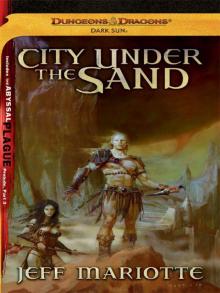 City Under the Sand
City Under the Sand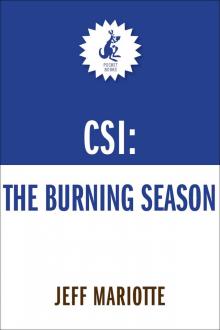 The Burning Season
The Burning Season Sanctuary
Sanctuary Winds of the Wild Sea
Winds of the Wild Sea Serpents in the Garden
Serpents in the Garden Close to the Ground
Close to the Ground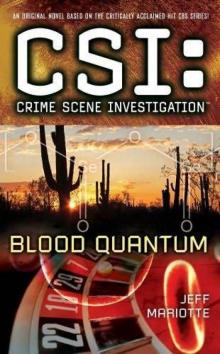 Blood Quantum
Blood Quantum Brass in Pocket
Brass in Pocket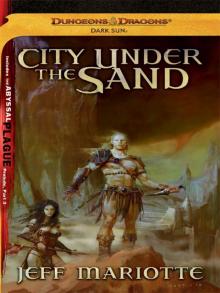 City Under the Sand: A Dark Sun Novel (Dungeons & Dragons: Dark Sun)
City Under the Sand: A Dark Sun Novel (Dungeons & Dragons: Dark Sun)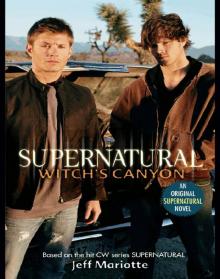 Witch's Canyon
Witch's Canyon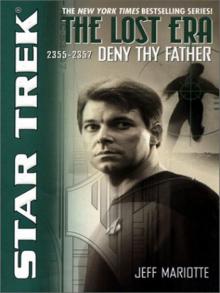 STAR TREK: The Lost Era - 2355-2357 - Deny Thy Father
STAR TREK: The Lost Era - 2355-2357 - Deny Thy Father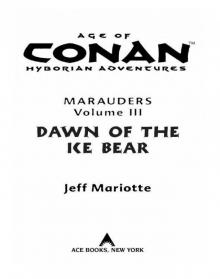 Dawn of the Ice Bear
Dawn of the Ice Bear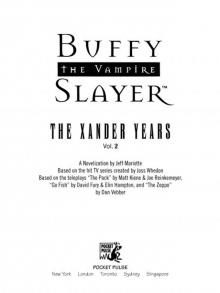 The Xander Years, Vol.2
The Xander Years, Vol.2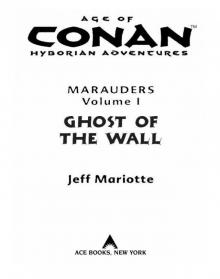 Ghost of the Wall
Ghost of the Wall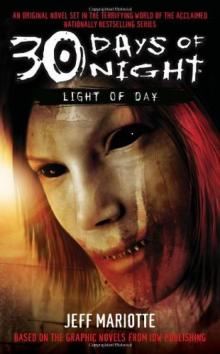 30 Days of Night: Light of Day
30 Days of Night: Light of Day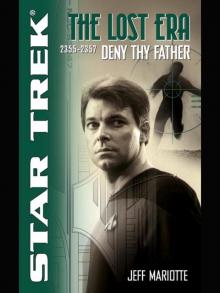 Deny Thy Father
Deny Thy Father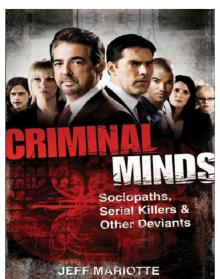 Criminal Minds
Criminal Minds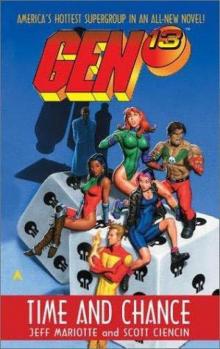 Time and Chance
Time and Chance The Folded World
The Folded World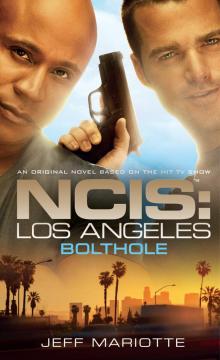 Bolthole
Bolthole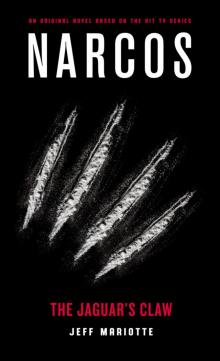 Narcos
Narcos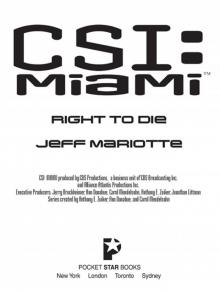 Right to Die
Right to Die